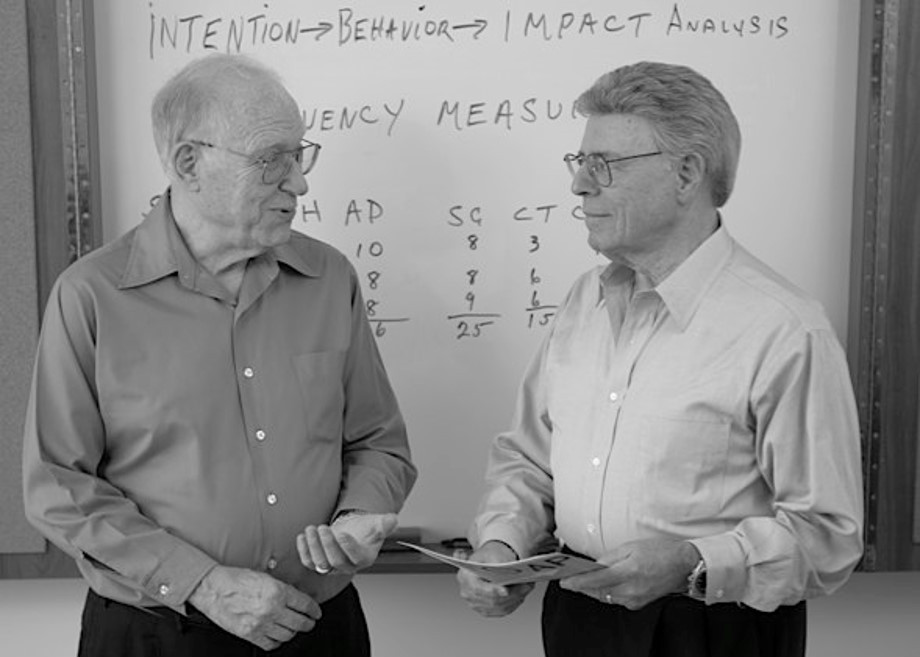The LIFO Method History:
50 Years of LIFO Success
First a Theory, Then a Method
In 1967, first the LIFO Survey originated as a positive and structured tool to supplement organizational development efforts and group dynamics training. The LIFO Survey helped people to understand their behavioral preferences, as well as how to improve themselves, and improve relationships by studying the interaction of each other’s personal styles and strengths.
Responding to the feedback and research provided by groups, Dr. Stuart Atkins, principal author of the Life Orientations Survey, developed the instrument along with his business partner Dr. Allan Katcher (1926-2017), and with consultant Dr. Elias Porter. It was based on the work of Erich Fromm (including productive and unproductive character orientations, and that strengths can become weakness when overused), Carl Rogers (Client-centered Counseling, congruence between what people think, feel, say and do, which led to the LIFO concept of the congruence between intention, behavior and impact), and Abraham Maslow (self actualization theory and Humanistic Psychology).
People were fascinated with the non-threatening, easy-to-accept interpretation of their survey results and were delighted with the objective way in which they could now talk to each other about their strengths and behavioral styles, as well as to manage behavior more effectively. After the positive experience of classifying their behavior, the respondents wanted to know what they could do with their newfound self-awareness and understanding.
To answer these questions, Dr. Atkins created the Life Orientations Method to go beyond analysis of the LIFO survey results to include six developmental strategies for performance improvement: Confirming, Capitalizing, Moderating, Supplementing, Extending, and Bridging. Atkins and Katcher also focused on the fit of the LIFO Survey with other instruments such as Hersey & Blanchard’s Situational Leadership, Dr. Will Schutz’s FIRO-B (now Element B), which were other instruments used in Dr. Atkins’s and Dr. Katcher’s various programs.
To simplify and aid memory, the Life Orientations trademark was shortened to “LIFO Method”, using a contraction of Life Orientations. Atkins and Katcher soon found the demand for the LIFO Survey and the LIFO Method outstripped their delivery capacity, so they started licensing organizational trainers in the LIFO Method and developing workbooks to accelerate learning.

Dr. Allan Katcher & Dr. Stuart Atkins
The Global Expansion of LIFO
In 1977, Dr. Katcher began to focus his LIFO practice internationally. Influenced by Peter Drucker (Strength Development and Strength Management), he expanded on the work, modifying the questions in the LIFO Survey to tailor them to specific training topics such as sales, leadership, executive coaching, team building, and for organization development applications. Today the LIFO Method includes many topic-specific surveys including Leadership Styles, Selling Styles, Coaching Styles, Stress Management Styles, and Learning Styles.
By appointing agents in many countries, Katcher spread the LIFO Method to over 30 countries in many different languages and created a worldwide network of LIFO practitioners and agents.
Dr. Atkins’ LIFO programs in the United States included Fortune 500 companies, small business, government agencies, religious organizations, universities, and hospitals. The programs emphasized the developmental strategies applied to management training, teamwork, individual productivity, and communications. He named this developmental emphasis LIFO Training.
To date, over nine million people in 20,000 organizations have used the LIFO Method and LIFO Training worldwide. One of the earliest agents, Business Consultants, Inc. (BCon) grew to be among the largest consulting firms in its country, Japan, and one of the largest users of LIFO Training in the world. In 2001, Business Consultants, Inc. purchased the two LIFO companies, Allan Katcher International Inc. and Stuart Atkins Inc. in order to integrate the worldwide reach and expertise of both companies.